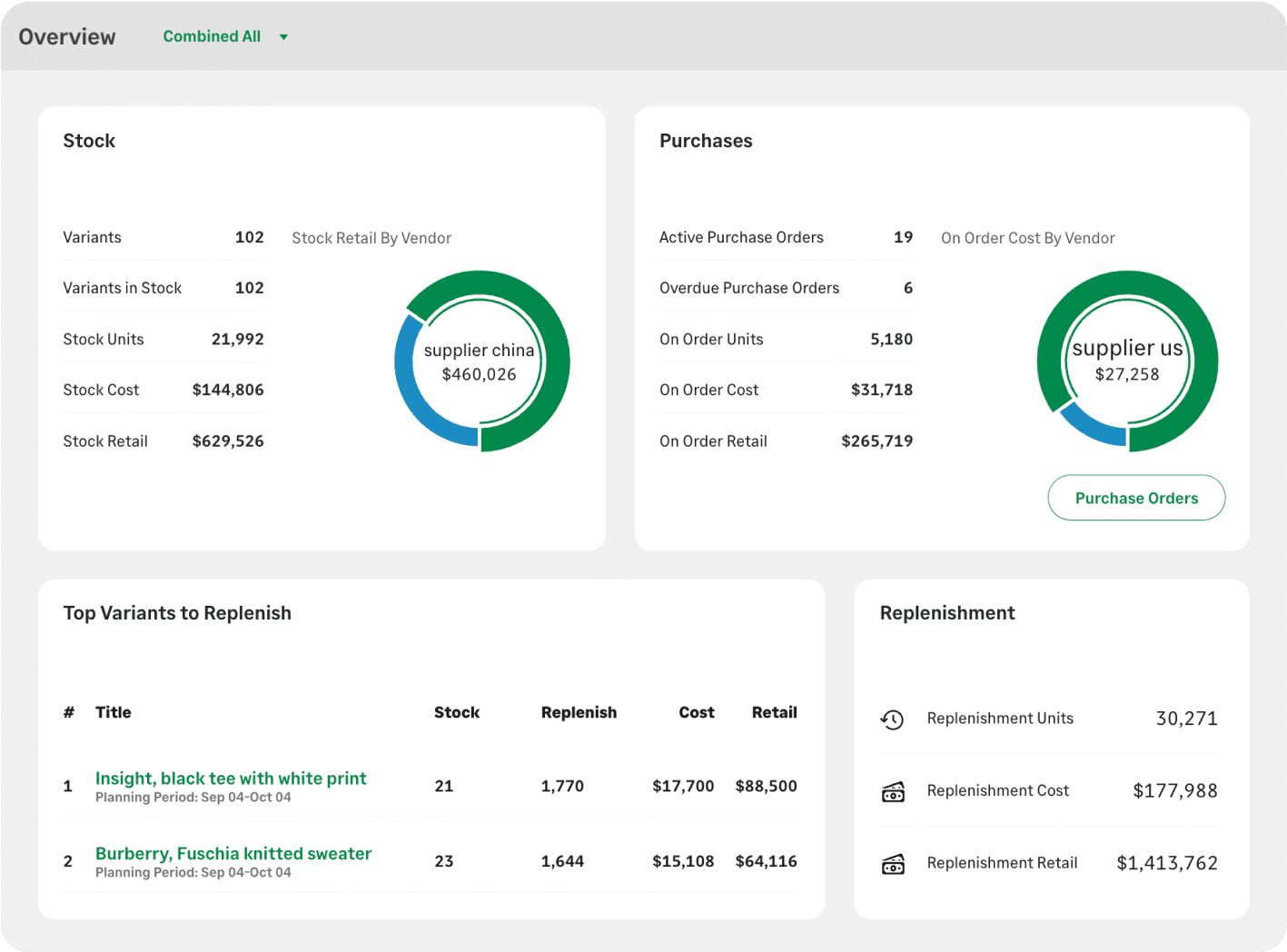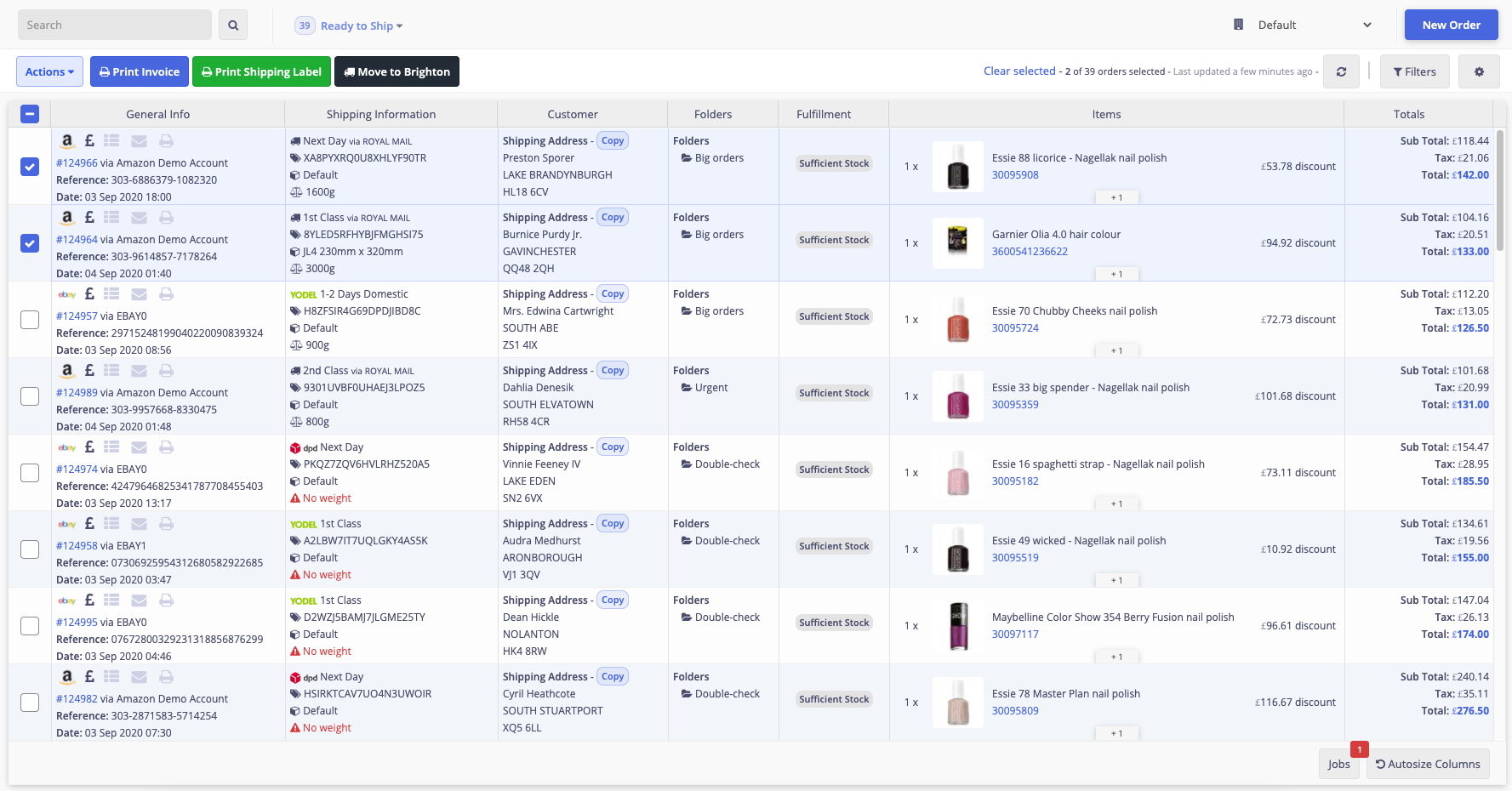Alternatives to Blue Yonder
1. Brightpearl
+Pros
- Proven workflow automation capabilities
- Multichannel integration approach
- Real-time analytics for customer acquisition cost, lifetime value, and inventory performance
-Cons
- Lack of native AI capabilities
- Higher entry costs
- Integration setup complexity
One highlighted feature and why it's amazing
Brightpearl's automation engine handles order routing, invoicing, and dropshipping through configurable rules.

Another highlighted feature of why it’s amazing
Includes pre-built connectors for major ecommerce platforms and sales channels, enabling centralized inventory management across warehouses and fulfillment locations.
2. Cin7 Core
+Pros
- AI Accessibility represents Cin7 Core's primary competitive advantage, making ForesightAI demand forecasting and IDR document processing available to mid-market businesses at price points significantly below enterprise solutions.
- Integration Breadth provides clear competitive differentiation through 700+ native connectors compared to alternatives like Zoho Inventory's 50+ integrations.
- Proven Customer Outcomes include measurable business results like HairCo's 10% sales boost and 50% time reduction in goods receiving processes.
-Cons
- Integration Stability Concerns emerge from customer reports of Shopify integration instability causing order synchronization issues despite advertised connector capabilities.
- Limited Advanced AI Capabilities compared to enterprise alternatives include no AI-powered dynamic pricing functionality and lack of blockchain traceability features available in solutions like Blue Yonder and SAP.
- Performance Validation Gaps rely heavily on vendor-provided case studies without independent third-party verification.
One highlighted feature and why it's amazing
Delivers predictive demand forecasting through machine learning algorithms that analyze historical sales data, seasonal patterns, and market trends.

Another highlighted feature of why it’s amazing
Automates purchase order processing, invoice handling, and shipping document management through machine learning-powered document analysis.
3. Linnworks
+Pros
- Proven multi-channel inventory synchronization across 100+ sales channels with customer evidence of 100% inventory accuracy achievement.
- Warehouse digitization capabilities through Pickwaves enable 70% reduction in manual warehouse tasks and 18% reduction in picking errors.
- Implementation simplicity compared to complex ERP solutions, with API-first integration reducing deployment timelines by 40% for organizations with established infrastructure.
-Cons
- AI capabilities are absent, with the platform relying on rule-based automation rather than machine learning algorithms.
- User reports indicate order processing delays during peak volume periods, suggesting scalability limitations under extreme load conditions.
- SMBs with <500 orders/month report cost-prohibitive pricing compared to alternatives like Expandly (£250/month unlimited SKUs) and Zoho Inventory ($99/month).
One highlighted feature and why it's amazing
Linnworks provides real-time inventory synchronization across 100+ sales channels including Shopify, Amazon, eBay, and other major platforms. Customer evidence shows 100% inventory accuracy achievement through automated syncing, eliminating stockouts and overselling issues that previously required manual intervention.

Another highlighted feature of why it’s amazing
The platform's mobile scanner compatibility and digital picklists enable significant operational improvements, with Buy Wholefoods Online achieving 70% reduction in manual warehouse tasks and 18% reduction in picking errors. The system supports barcode scanning, automated carrier assignment, and real-time inventory updates across fulfillment locations.
Other Alternatives
Microsoft Dynamics 365 Commerce
SAP Commerce Cloud
ShipBob
Shopify Plus
Zoho Inventory
How We Researched This Guide
About This Guide: This comprehensive analysis is based on extensive competitive intelligence and real-world implementation data from leading AI vendors. StayModern updates this guide quarterly to reflect market developments and vendor performance changes.
207+ verified sources per analysis including official documentation, customer reviews, analyst reports, and industry publications.
- • Vendor documentation & whitepapers
- • Customer testimonials & case studies
- • Third-party analyst assessments
- • Industry benchmarking reports
Standardized assessment framework across 8 key dimensions for objective comparison.
- • Technology capabilities & architecture
- • Market position & customer evidence
- • Implementation experience & support
- • Pricing value & competitive position
Research is refreshed every 90 days to capture market changes and new vendor capabilities.
- • New product releases & features
- • Market positioning changes
- • Customer feedback integration
- • Competitive landscape shifts
Every claim is source-linked with direct citations to original materials for verification.
- • Clickable citation links
- • Original source attribution
- • Date stamps for currency
- • Quality score validation
Analysis follows systematic research protocols with consistent evaluation frameworks.
- • Standardized assessment criteria
- • Multi-source verification process
- • Consistent evaluation methodology
- • Quality assurance protocols
Buyer-focused analysis with transparent methodology and factual accuracy commitment.
- • Objective comparative analysis
- • Transparent research methodology
- • Factual accuracy commitment
- • Continuous quality improvement
Quality Commitment: If you find any inaccuracies in our analysis on this page, please contact us at research@staymodern.ai. We're committed to maintaining the highest standards of research integrity and will investigate and correct any issues promptly.